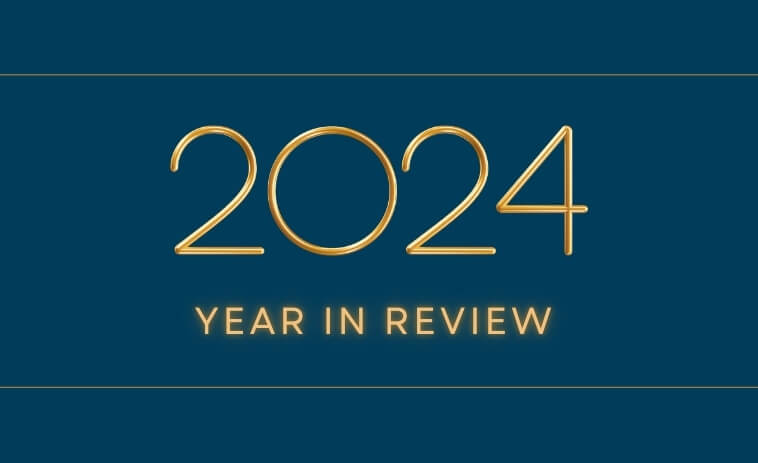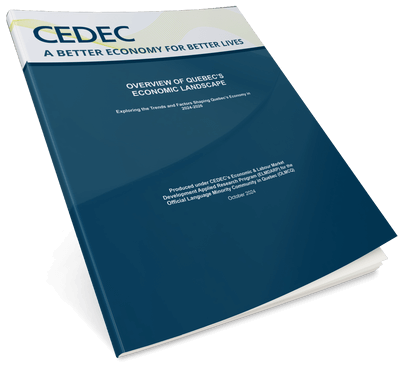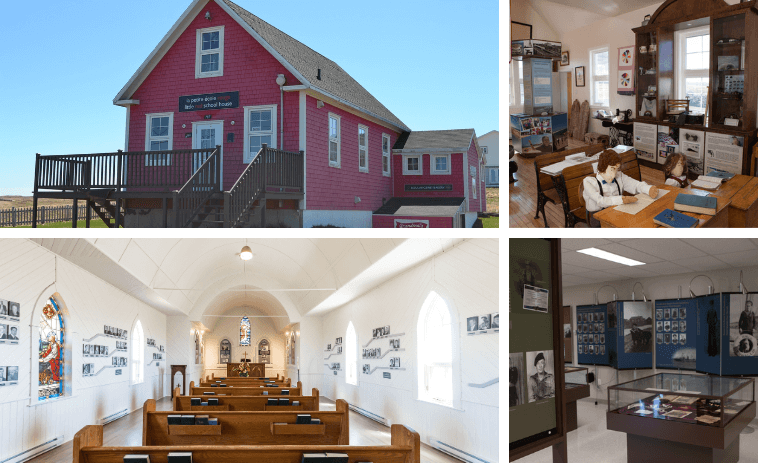2024 in review

Showcasing CEDEC's Key Initiatives in 2024
Key initiatives that CEDEC created, guided, and supported in 2024 focused on strengthening the contribution of English-speakers and the Official Language Minority Community in Quebec to grow and develop Quebec’s economy.
Working with multiple stakeholders and Venture partners, CEDEC continued to generate tangible economic impacts for English-speakers, their businesses, social enterprises, and communities, along with the broader Francophone community, in which they live and thrive.
KNOWLEDGE CREATION, SHARING AND APPLICATION
Adding to research on English-speakers and Official Language Minority Community in Quebec (OLMCQ) is an important part of CEDEC’s work. Under its OLMCQ Economic & Labour Market Development Applied Research Program, CEDEC accomplished the following:
- Produced the 2024-2026 Overview of Quebec’s Economic Landscape (OQEL). The OQEL identified three major trends shaping the province’s economy: a) transforming the economy through the accelerated adoption of Artificial Intelligence (AI) and digital technology; (b) transitioning towards a greener, more sustainable economy, and (c) shifting demographics as an economic driver.

- Conducted the first three of nine Collaborative Economic Development Dialogues (CEDDs) based upon the findings of the OQEL. These qualitative research sessions brought together select OLMCQ stakeholders and representatives of Quebec’s Francophone majority community to explore how to take practical advantage of AI and digital technology in (a) agriculture and (b) tourism, and (c) how to leverage e-commerce in rural communities. Additional CEDDs are planned for different locations across Quebec in 2025.
- Announced the 2025-2026 Flagship Report, which will present a Collaborative Economic Development roadmap, featuring promising economic development opportunities for the OLMCQ identified by the CEDDs.
- Actively guided and supported Venture-specific research activities, helping (a) EmployESBC better understand Black and Black Immigrant populations in Quebec, and (b) the Côte-Nord – Labrador Interprovincial Tourism Venture design and carry out a survey to establish a baseline to measure economic benefits resulting from enhanced tourism activity along the Expedition 51° route. Details about the opportunities and Ventures CEDEC is guiding can be found below.
PUBLIC, PRIVATE AND CIVIL SOCIETY VENTURE DEVELOPMENT
CEDEC engaged stakeholders across the province to identify Collaborative Economic Development opportunities. Opportunities must be real possibilities to leverage public, private, and civil society assets. They must generate tangible economic benefits for individuals, businesses, social enterprises, the OLMCQ and the broader Francophone community. These opportunities must be (a) clearly defined, (b) capable of market entry, (c) have a real chance of successful implementation, (d) be supported by adequate funding and resources, and (e) led by credible and committed stakeholders.
In 2024, CEDEC prepared socio-demographic profiles and carried out on-the ground intelligence gathering to identify and analyse promising Collaborative Economic Development opportunities in different locations across Quebec:
• Baie-Comeau
• Très-Saint-Sacrement / Howick
• Trois-Rivières
• Huntingdon
• Georgetown
• Sutton
• Drummondville
• Pontiac region
Once an opportunity is selected, the next step is transforming the opportunity into a viable Public, Private, and Civil Society Venture. CEDEC guides the development of a Venture, and the partners act as the enterprise owner. With the partners in place, the Venture (a) creates a business plan, (b) conducts market research, (c) develops a budget, (d) acquires adequate funding, (e) hires relevant human resources, and most importantly, (f) takes action to produce the concrete economic benefits it was designed to deliver.
Once a Venture is up and running, CEDEC acts as the Collaborative Economic Development Hub, guiding each established Venture. CEDEC specifically provides research, market information, organizational performance, evaluation advice, and support. CEDEC remains involved to ensure Ventures remain viable, sustainable, and capable of adapting to the dynamics of their respective markets.
In 2024, CEDEC is guiding the following Ventures:
EmployESBC matches English-speaking and bilingual Black Quebecers with forward-looking jobs in the Greater Montreal Area.
The Côte-Nord – Labrador Interprovincial Tourism Venture is focused on increasing tourist spending and stays along the Expedition 51° route of the Québec-Labrador Highway.
The Sutton Tourism Venture is focused on increasing tourist spending and stays in the Town of Sutton.
The Très-Saint-Sacrement / Howick Venture is focused on expanding business and social enterprise-based care services in the health sector.
The Magdalen Islands International Cruise Ship Tours Venture developed two experiential tours to enable visitors to learn about the life, history, and culture of English speakers on Grosse-Île and enjoy a taste of a local product.
POLICY ADVICE AND ADVOCACY
Since the introduction of new legislation to renew Canada’s Official Languages Act (OLA) in 2021, CEDEC has actively advocated for Parliament and the Government of Canada to recognize and support economic development as a key foundation of individual and organizational wellbeing, and community vitality.
- In October 2024, one aspect of CEDEC’s policy aspirations were met when the House of Commons Standing Committee on Official Languages endorsed Collaborative Economic Development as “one of the socioeconomic models best suited to the needs of Quebec’s English-speaking communities” and recommended that the government consider this model when working with the OLMCQ. The Committee’s support of unprecedented collaboration in the OLMCQ economic development space is now a critical guidepost for future federal OLMCQ policy and funding action.
- CEDEC published and promoted its position on optimizing the social economy’s contribution to the economic development of the OLMCQ in 2024. The position paper emphasized the need for strengthening the targeting of federal Official Language investments in this area, especially to help reduce OLMCQ economic disparities by 50% over the next 10 years. CEDEC offered to have the Collaborative Economic Development ECOSYSTEM define and support the implementation and coordination of a coherent set of Official Language social economy investments at the community, regional, and provincial levels to achieve this objective.
- CEDEC also developed and promoted its OLMCQ Workforce Development Strategy. The strategy has at its core the development and the coordination of a talent development supply chain, which would provide English speakers with a continuum of lifelong learning opportunities to improve their access to and mobility within Quebec’s labour market. In addition, the OLMCQ Workforce Development Strategy would put in place a pan-Quebec talent matching platform linking English speaking job seekers to employers across the province.
INFLUENCING GLOBAL APPROACHES TO ECONOMIC DEVELOPMENT
Influencing economic development practice outside of Quebec and Canadian borders is part of CEDEC’s work. CEDEC believes that the collaborative and innovative approach it has developed to economic development generates tremendous benefits for individuals, businesses, social enterprises, and communities. It takes every opportunity to promote this unique approach.
As chair of the Local Development Forum of the Organisation for Economic Co-operation and Development (OECD), President / CEO John Buck moderated the closing plenary session of this year’s OECD Local Development Forum, which focused on the importance of local leadership during transitions, how policy makers and practitioners can improve data collection and use to better understand and respond to the needs of communities and workers during transitions.
A LAST WORD
CEDEC appreciates the ongoing and active support it receives from multiple stakeholders and Venture partners across Quebec, Newfoundland and Labrador, and beyond. Without their help, the 2024 activities and accomplishments described above would simply not be possible.
In 2025 CEDEC will continue to leverage its Collaborative Economic Development approach to strengthen the economic benefits created for English speakers, their communities, and the broader Francophone communities in which they live and thrive.

